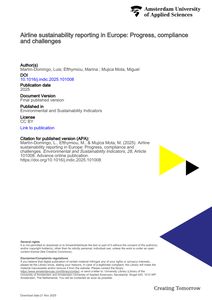This study systematically evaluates greenhouse gas (GHG) emissions reporting practices of European airline groups, covering both mandatory and voluntary key performance indicators (KPIs) under evolving regulatory frameworks. By analysing annual and sustainability reports from 16 major airline groups, the research identifies significant progress in the reporting of core metrics, with Scope 1 CO2 totals reported by 94 % and emissions intensity by 88 %, reflecting growing regulatory alignment and stakeholder expectations. However, persistent gaps remain: Scope 2 and Scope 3 reporting appears in only 56 % and 50 % of cases, respectively, while non-CO2 emissions are disclosed by just 38 %, despite forthcoming European Union Emissions Trading System (EU ETS) monitoring requirements. Reporting on sustainable aviation fuels (SAF) life-cycle emissions is limited (19 %), and CO2 offsetting disclosures are rare (6 %), complicating verification of decarbonisation claims and readiness for ReFuelEU Aviation and Carbon Offsetting and Reduction Scheme for International Aviation (CORSIA). The proliferation of voluntary KPI disclosures further complicates comparability due to a lack of standardization and clear definitions. These challenges are compounded by risks of greenwashing, where airlines selectively report favourable data such as emissions intensity, and greenhushing, where substantive achievements are under-communicated. The study concludes that while regulatory frameworks such as the Corporate Sustainability Reporting Directive (CSRD), the EU ETS, CORSIA, and ReFuelEU are driving improvements, further harmonization and methodological clarity are required to ensure transparency, comparability, and genuine progress toward aviation's climate goals.
DOCUMENT

MULTIFILE
DOCUMENT
The purpose of this study is to show how local authorities (municipalities) deal with their community real estate. The study is an annually recurring research: every year since 2008 (except for 2013), Dutch municipalities have been asked to complete a questionnaire about how they manage their real estate. With these results it is possible to perform quantitative analyses on both trends and the current situation.The questionnaire responses have led to the following conclusions: (1) Half of themunicipalities has a policy but takes few risk measures, (2) Withdrawing local government, (3) Management and operations most outsourced tasks, (4) Obstacles remain unchanged, (5) Cost reduction most relevant policy theme since 2009, (6) Relevance of some policy themes depends on municipality size, (7) More real estate is offered, smaller percentage is sold, 8) More FTEs for real estate management, especially executive tasks and (9) Conscious focuson quality. Dutch municipalities tune their new developments of the municipal real estate policy to the results of the Barometer for Municipal Community Real Estate. This leads to a further development of professionalism of the municipal real estate portfolios.The contribution to science is showing patterns of community real estate management at Dutch municipalities. A longitudinal study of this size on this subject is unique in The Netherlands.
DOCUMENT

This century, greenhouse gas emissions such as carbon dioxide, methane and nitrogen oxides must be significantly reduced. Greenhouse gases absorb and emit infrared radiation that contributes to global warming, which can lead to irreversible negative consequences for humans and the environment. Greenhouse gases are caused by the burning of fossil fuels such as crude oil, coal, and natural gas, but livestock farming, and agriculture are also to blame. In addition, deforestation contributes to more greenhouse gases. Of the natural greenhouse gases, water vapor is the main cause of the greenhouse effect, accounting for 90%. The remaining 10% is caused from high to low by carbon dioxide, methane, nitrogen oxides, chlorofluorocarbons, and ozone. In addition, there are industrial greenhouse gases such as fluorinated hydrocarbons, sulphurhexafluoride and nitrogen trifluoride that contribute to the greenhouse effect too. Greenhouse gases are a major cause of climate change, with far-reaching consequences for the welfare of humans and animals. In some regions, extreme weather events like rainfall are more common, while others are associated with more extreme heat waves and droughts. Sea level rise caused by melting ice and an increase in forest fires are undesirable effects of climate change. Countries in low lying areas fear that sea level rise will force their populations to move to the higher lying areas. Climate change is affecting the entire world. An estimated 30-40% o f the carbon dioxide released by the combustion of fossil fuels dissolves into the surface water resulting in an increased concentration of hydrogen ions. This causes the seawater to become more acidic, resulting in a decreasing of carbonate ions. Carbonate ions are an important building block for forming and maintaining calcium carbonate structures of organisms such as oysters, mussels, sea urchins, shallow water corals, deep sea corals and calcareous plankton.
MULTIFILE
The growing sophistication, frequency and severity of cyberattacks targeting all sectors highlight their inevitability and the impossibility of completely protecting the integrity of critical computer systems. In this context, cyber-resilience offers an attractive alternative to the existing cybersecurity paradigm. We define cyber-resilience as the capacity to withstand, recover from and adapt to the external shocks caused by cyber-risks. This article seeks to provide a broader organizational understanding of cyber-resilience and the tensions associated with its implementation. We apply Weick's (1995) sensemaking framework to examine four foundational tensions of cyber-resilience: a definitional tension, an environmental tension, an internal tension, and a regulatory tension. We then document how these tensions are embedded in cyber-resilience practices at the preparatory, response and adaptive stages. We rely on qualitative data from a sample of 58 cybersecurity professionals to uncover these tensions and how they reverberate across cyber-resilience practices.
DOCUMENT
